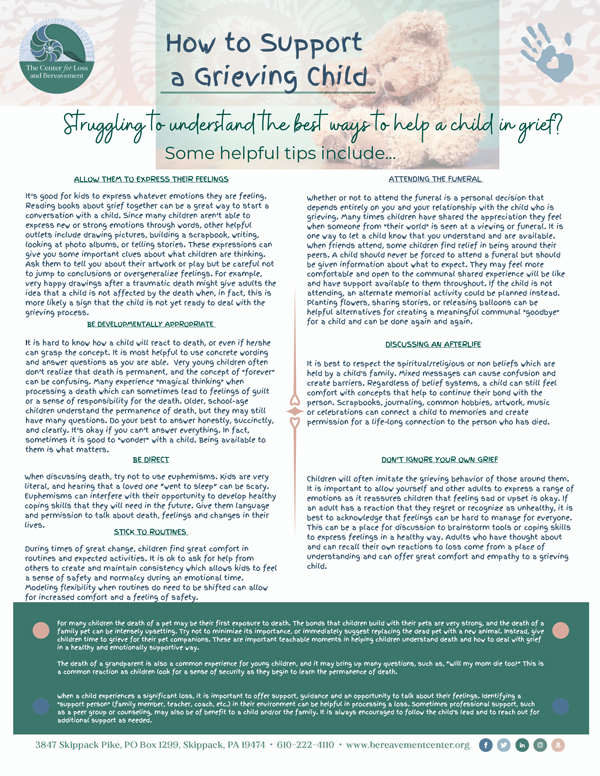CLB Tip Sheets
How to Support a Grieving Child
Struggling to understand the best ways to help a child in grief?
Some helpful tips include…
ALLOW THEM TO EXPRESS THEIR FEELINGS
It’s good for kids to express whatever emotions they are feeling. Reading books about grief together can be a great way to start a conversation with a child. Since many children aren’t able to express new or strong emotions through words, other helpful outlets include drawing pictures, building a scrapbook, writing, looking at photo albums, or telling stories. These expressions can give you some important clues about what children are thinking. Ask them to tell you about their artwork or play but be careful not to jump to conclusions or overgeneralize feelings. For example, very happy drawings after a traumatic death might give adults the idea that a child is not affected by the death when, in fact, this is more likely a sign that the child is not yet ready to deal with the grieving process.
BE DEVELOPMENTALLY APPROPRIATE
It is hard to know how a child will react to death, or even if he/she can grasp the concept. It is most helpful to use concrete wording and answer questions as you are able. Very young children often don’t realize that death is permanent, and the concept of “forever” can be confusing. Many experience “magical thinking” when processing a death which can sometimes lead to feelings of guilt or a sense of responsibility for the death. Older, school-age children understand the permanence of death, but they may still have many questions. Do your best to answer honestly, succinctly, and clearly. It’s okay if you can’t answer everything. In fact, sometimes it is good to “wonder” with a child. Being available to them is what matters.
BE DIRECT
When discussing death, try not to use euphemisms. Kids are very literal, and hearing that a loved one “went to sleep” can be scary. Euphemisms can interfere with their opportunity to develop healthy coping skills that they will need in the future. Give them language and permission to talk about death, feelings and changes in their lives.
STICK TO ROUTINES
During times of great change, children find great comfort in routines and expected activities. It is ok to ask for help from others to create and maintain consistency which allows kids to feel a sense of safety and normalcy during an emotional time. Modeling flexibility when routines do need to be shifted can allow for increased comfort and a feeling of safety.
ATTENDING THE FUNERAL
Whether or not to attend the funeral is a personal decision that depends entirely on you and your relationship with the child who is grieving. Many times children have shared the appreciation they feel when someone from “their world” is seen at a viewing or funeral. It is one way to let a child know that you understand and are available. When friends attend, some children find relief in being around their peers. A child should never be forced to attend a funeral but should be given information about what to expect. They may feel more comfortable and open to the communal shared experience will be like and have support available to them throughout. If the child is not attending, an alternate memorial activity could be planned instead. Planting flowers, sharing stories, or releasing balloons can be helpful alternatives for creating a meaningful communal “goodbye” for a child and can be done again and again.
DISCUSSING AN AFTERLIFE
It is best to respect the spiritual/religious or non beliefs which are held by a child’s family. Mixed messages can cause confusion and create barriers. Regardless of belief systems, a child can still feel comfort with concepts that help to continue their bond with the person. Scrapbooks, journaling, common hobbies, artwork, music or celebrations can connect a child to memories and create permission for a life-long connection to the person who has died.
DON’T IGNORE YOUR OWN GRIEF
Children will often imitate the grieving behavior of those around them. It is important to allow yourself and other adults to express a range of emotions as it reassures children that feeling sad or upset is okay. If an adult has a reaction that they regret or recognize as unhealthy, it is best to acknowledge that feelings can be hard to manage for everyone. This can be a place for discussion to brainstorm tools or coping skills to express feelings in a healthy way. Adults who have thought about and can recall their own reactions to loss come from a place of understanding and can offer great comfort and empathy to a grieving child.
For many children the death of a pet may be their first exposure to death. The bonds that children build with their pets are very strong, and the death of a family pet can be intensely upsetting. Try not to minimize its importance, or immediately suggest replacing the dead pet with a new animal. Instead, give children time to grieve for their pet companions. These are important teachable moments in helping children understand death and how to deal with grief in a healthy and emotionally supportive way.
The death of a grandparent is also a common experience for young children, and it may bring up many questions, such as, “Will my mom die too?” This is a common reaction as children look for a sense of security as they begin to learn the permanence of death.
When a child experiences a significant loss, it is important to offer support, guidance and an opportunity to talk about their feelings. Identifying a “support person” (family member, teacher, coach, etc.) in their environment can be helpful in processing a loss. Sometimes professional support, such as a peer group or counseling, may also be of benefit to a child and/or the family. It is always encouraged to follow the child’s lead and to reach out for additional support as needed.
Join Our
Mailing List
Donate
Today
Request
Information

Affiliations
• NACG
• CBEM Changemaker
• ADEC
• Charity Navigator
Quick Links
About Us
Individual & Family Grief Counseling
Volunteer
News
Grief Support Resources
Contact
Ph: 610-222-4110
Fax: 610-222-4116
3847 Skippack Pike
P.O. Box 1299
Skippack, PA 19474
Support The Center For
Loss and Bereavement
